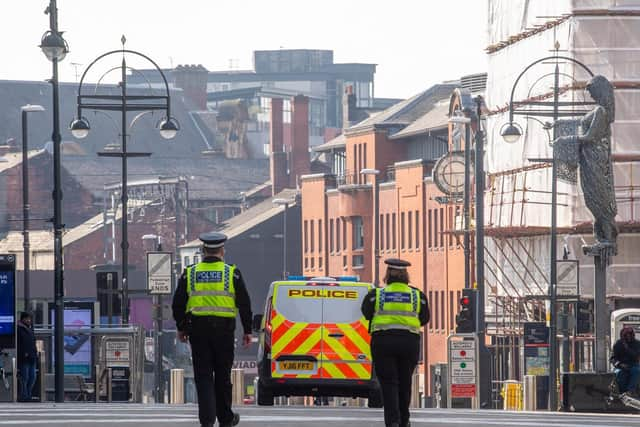Ban on singing and dancing in pubs and bars in new Covid restrictions and isolation fines of up to £10,000
and live on Freeview channel 276
Wide-ranging laws and the list of punishments were revealed in legal documents and came into force on Monday.
Now, by law, people in England must self-isolate if they test positive for coronavirus, or are contacted by the test and trace service, or face fines starting from £1,000, rising to £10,000 for repeat offenders.
Advertisement
Hide AdAdvertisement
Hide AdThose who test positive must do so for 10 days after displaying symptoms, or from their test date if they are asymptomatic, while members of their household must isolate for 14 days.


Meanwhile it emerged that separate laws, which also came into force on Monday, ban pubs, bars, restaurants and cafes from playing music which exceeds 85 decibels, although live performances are exempt.
The same rules also say that pub landlords or those who run other venues like hotel bars, restaurants and members clubs, must take “all reasonable measures” to stop singing on the premises by customers in groups of more than six, and dancing.
Wedding ceremonies and receptions are exempt from the rule.
Advertisement
Hide AdAdvertisement
Hide AdBut some industry leaders said the growing restrictions on hospitality businesses were making it hard for pubs to survive.
The self-isolation rules show there is a £4,000 first-time fine for those who are “reckless” by coming into contact with others when they know they should be self-isolating.
For example, going into an office or crowded place when you know this could put people at risk after being told to self-isolate.
The Prime Minister’s official spokesman said: “We know that the vast majority of people want to do the right thing.
Advertisement
Hide AdAdvertisement
Hide Ad“What we are setting out is that those who recklessly take risks with the health of their friends, families and communities should expect this to be taken seriously.”
Staff also face a £50 fine for failing to tell their employer they have to self-isolate.
The rules also prohibit an employer from allowing staff to attend any place of work, or anywhere connected to their work, while they are having to self-isolate.
Employers must not knowingly allow people to go into work if they know they have to self-isolate.
Advertisement
Hide AdAdvertisement
Hide AdPolice will be carrying out spot checks on people who are meant to be self-isolating in “high incidence areas” and on “high-risk groups” based on “local intelligence”, the Department of Health and Social Care said.
According to the laws, people can self-isolate at home, in state-provided accommodation, a bed and breakfast or with a friend or relative.
They cannot leave unless they have a reasonable excuse – which includes seeking urgent medical assistance, buying food or medicine when there is no other means of obtaining them, going to court, to escape danger and to go to a funeral.
Advertisement
Hide AdAdvertisement
Hide AdThose on low incomes who cannot work from home, and have lost income as a result, will also be eligible for a new £500 test and trace support payment, the department added.
The Prime Minister’s official spokesman added: “We have set out details of the new rules on self-isolation just over a week ago now, in order to give people advance notice of what the system would be.
“Obviously we have subsequently been finalising the regulations and making sure that we have got all the steps that we need in place for contact tracing to be effective and to ensure that the self-isolation rules can be properly followed.”
Emma McClarkin, chief executive of the British Beer and Pub Association, said: “The cumulative impact of layering restriction upon restriction is making it harder for pubs to survive.
Advertisement
Hide AdAdvertisement
Hide Ad“We have already seen a total ban on music in pubs in Scotland, which has seen trade plummet there.
“The sector has not been consulted on the evidence base for these extra restrictions on music.
“We are acutely aware of our responsibilities as businesses, but the Government is in danger of cutting off any chance of a recovery.”
Comment Guidelines
National World encourages reader discussion on our stories. User feedback, insights and back-and-forth exchanges add a rich layer of context to reporting. Please review our Community Guidelines before commenting.